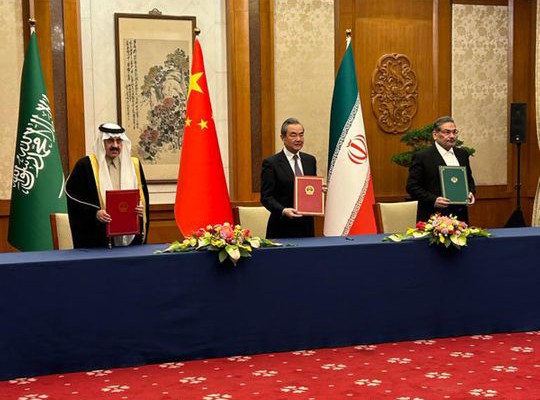Rise of a new world order

The Chinese-sponsored Saudi-Iran deal could be a game-changer.
The Beijing agreement between Saudi Arabia and Iran should not only be viewed from the perspective of restoring the two countries’ diplomatic relations and reopening embassies. It was also a big step towards reconciling the Islamic world’s two major denominations — Shia and Sunni — and curbing sectarian incitement to foment discord and division between them, that has been instigated for years by the US and Israel and their security services and client networks.
By hosting the final round of negotiations that culminated in the agreement, China raised its profile in the Middle East while US influence declines in a region containing the world’s biggest oil and gas reserves. That is only to be expected from a superpower. Iran and Qatar are the world’s second and third biggest gas producers, and Saudi Arabia its top oil exporter. It’s no surprise to hear that China plans to host a summit for GCC and Iranian leaders in Beijing next month to encourage a reduction in tensions between the two sides.
It’s equally no surprise that there should be a backlash against this historic reconciliation from various Arab parties and Israel that were caught unawares by it. They had been planning on escalating the Iranian-Saudi conflict and related crises in Yemen, Lebanon, and Syria. They are now trying to cast doubt on the accord by noting that there’ll be a delay of two months ‘as a test of intentions’ before embassies are reopened and ambassadors sent back. In fact, this is merely a practical measure related to the need to rehabilitate embassy buildings that were vacant for eight years (and in the case of the Saudi embassy in Tehran stormed by protestors). Of course, there will have to be a transitional period when moving from total enmity and estrangement to reconciliation and cooperation.
An early positive outcome of this accord has been a cessation of media campaigns and sectarian incitement between the two sides. This can be seen not only in their audio-visual outlets but also on social media. It would not be surprising if they were to wind down their hostile propaganda machines such as the Saudi-funded Iran International channel and similar networks on the Iranian side.
Much concern has been voiced on social media that the US and Israel, the main parties disadvantaged by the agreement, will strive to foil it, and could resort to military action against Iran as an option. These fears are understandable. But there are several reasons why the deal is unlikely to be thwarted.
First: The US administration is engaged in a proxy war in Ukraine, and the facts on the ground confirm its Russian enemy is holding out, especially in the economic sphere with sanctions failing and oil and gas prices rising. The US is in no position to start a new war in the Middle East.
Second: The Israeli occupation state has never been weaker, facing escalating internal strife and a new wave of Palestinian resistance, which threaten the security, stability, and economic prosperity on which its existence depends. It could not cope with the barrage of retaliatory missiles and drones that would result from any aggression against Iran.
Third: Saudi Arabia’s accelerating exit from the US axis weakens the Arab countries that remain in it and strip them of their military and economic relevance. They have serious domestic problems and will face huge internal opposition if they get involved in a US-Israeli war against an Iran that is reconciled with Saudi Arabia.
Fourth: This accord could lead to the end of all the crises related to the Saudi-Iranian rivalry — in Yemen, Syria, and Lebanon — which the US has been stoking: an end to the war in Yemen; a new political deal in Lebanon; and maybe even the lifting of sanctions against Syria and enabling its reconstruction.
Israeli Prime Minister Benjamin Netanyahu used to boast that his first foreign visit in his new term would be to Abu Dhabi, and Saudi Arabia would be the first country to sign up to the Abraham Accords. Neither thing happened. The UAE not only shelved any visit but cancelled a touted billion-dollar purchase of Israeli air defence systems, and Saudi Arabia denied entry visas to an Israeli delegation that wanted to attend a conference in al-Ula.
If this agreement holds, it will change the strategic map of the Middle East. Far from accelerating an Israeli-US attack on Iran, it will hasten the demise of US influence in the region, and perhaps the State of Israel. It is interesting that the interlocutors in Beijing agreed not to use the English language in their negotiations but only Arabic, Farsi, and Mandarin. That says something about the beginning of the end ofWestern cultural, political, and military hegemony, and the rise of a new world order.
https://www.raialyoum.com/rise-of-a-new-world-order/
 TheAltWorld
TheAltWorld 
0 thoughts on “Rise of a new world order”